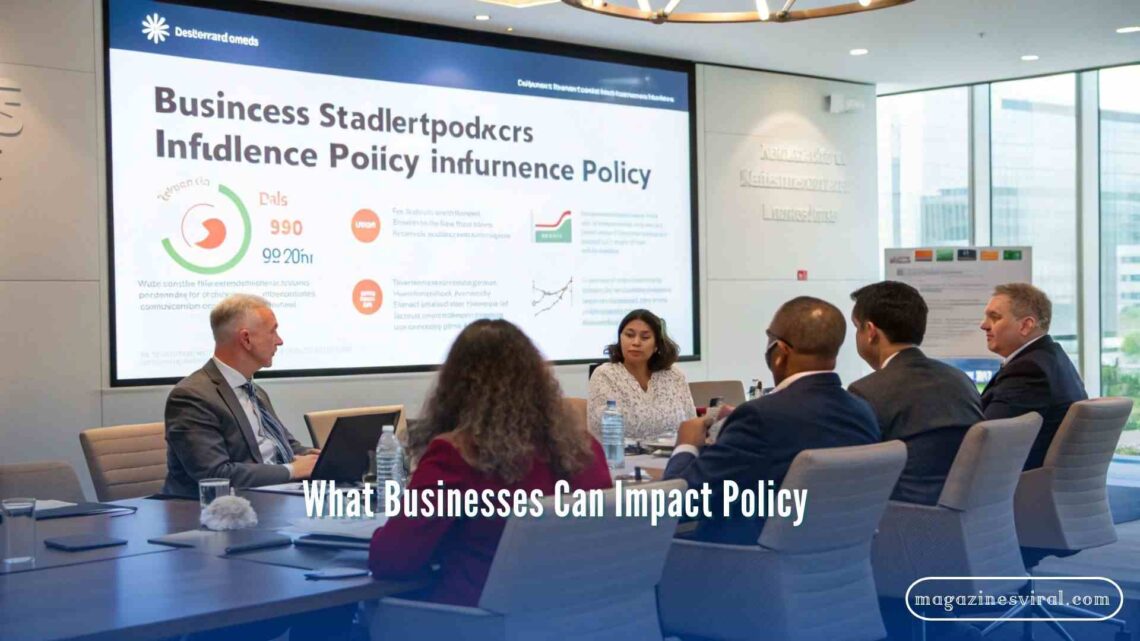Big companies, tech firms and business groups can impact policy by talking to leaders and sharing their ideas. They help shape rules that affect the economy and daily life.
Stay with us as we talk more about what businesses can impact policy. We’ll share simple and clear info on how different companies help shape the rules that affect us all. Keep reading for more easy tips and facts!
Why Do Businesses Influence Policy?
Businesses influence public policy for several strategic reasons, including:
| Reason | Explanation |
| Regulatory protection | Prevent or ease regulations that could harm profits |
| Market access and expansion | Influence trade policy or industry rules to support growth |
| Cost savings | Push for tax breaks, subsidies, or relaxed labor laws |
| Social responsibility | Address social issues (e.g., climate change, diversity) aligned with brand values |
| Innovation enablement | Shape favorable tech, healthcare, or IP laws that allow new ideas to flourish |
The goal is clear: businesses want policies that make it easier to succeed.
Types of Businesses That Can Impact Policy (Expanded)

Multinational Corporations (MNCs)
MNCs like Apple, Shell, and Toyota operate in dozens of countries, giving them leverage over trade deals, labor laws, and environmental policy. They often:
- Lobby governments to standardize regulations across markets
- Influence international institutions like the WTO, IMF, and UN
- Use supply chain dominance to negotiate favorable terms
Big Tech Firms
Big Tech has become one of the most influential sectors in shaping policy due to the rise of:
- Digital privacy concerns
- Artificial intelligence (AI) regulations
- Content moderation and censorship laws
- Monopoly and antitrust actions
For example Google and Facebook have spent millions on lobbying to avoid stricter privacy laws in the U.S. while negotiating compliance with the EU’s GDPR.
Pharmaceutical and Healthcare Companies
This sectors influence is especially visible in:
- Drug approval timelines
- Intellectual property laws
- Health insurance policy
They also influence public health policy, as seen during the COVID-19 pandemic, where vaccine companies like Pfizer worked closely with governments around the world.
Energy and Natural Resources Sector
Whether it’s fossil fuel giants like ExxonMobil or renewable energy firms like Tesla, the energy sector plays a major role in:
- Climate change negotiations
- Environmental standards
- Infrastructure investment decisions
- Green subsidies and tax incentives
In many countries, these businesses help write or block climate legislation altogether.
Financial Institutions
Banks insurance firms and investment groups influence policies on:
- Lending standards
- Interest rates
- Financial disclosures
- Cryptocurrency regulations
Post-2008, these firms have been central to financial reform debates globally.
Defense and Aerospace Companies
In the U.S companies like Lockheed Martin and Boeing benefit from:
- Massive defense budgets
- Foreign policy decisions
- International arms deals
Their lobbyists often help shape military aid and national security legislation.
Agriculture and Food Industry
Agribusinesses impact:
- Subsidy allocations
- GMO regulations
- Food labeling laws
- Trade policies affecting import/export
Monsanto (now Bayer) and Cargill are examples of companies that have significantly influenced U.S. and global food policy.
Media and Telecommunications
These companies influence:
- Free speech policy
- Broadcasting rights
- Anti-piracy laws
- Digital surveillance policies
Companies like Disney, Comcast, and Netflix actively shape copyright laws and net neutrality debates.
Tactics Businesses Use to Shape Policy (Expanded)
Understanding how businesses influence policy requires examining the wide variety of tools and strategies at their disposal:
Lobbying
The most direct form. In the U.S. alone, over $3.7 billion was spent on lobbying in 2023. Lobbyists:
- Meet with lawmakers
- Provide policy suggestions
- Influence bill language
Political Campaign Contributions
Businesses donate to candidates who support their interests via:
- PACs (Political Action Committees)
- Super PACs (for unlimited spending)
- “Dark money” nonprofits
Corporate Advocacy & Public Relations
Campaigns aimed at influencing public opinion can pressure lawmakers to act. For example:
- Ads advocating for healthcare reform
- Grassroots mobilization via social media
- Sponsoring educational content
Litigation and Legal Action
Sometimes companies sue governments to overturn unfavorable laws. Notable examples include:
- Philip Morris suing Australia over cigarette packaging laws
- Chevron using investor-state arbitration clauses in trade agreements
Policy Think Tanks and Research Funding
By funding academic and policy research institutions, companies:
- Shape the conversation
- Influence long-term policy directions
- Gain credibility
Public-Private Partnerships (PPPs)
Businesses collaborate with governments on infrastructure, education, or healthcare—often helping define the scope and standards of the partnership.
Real-World Examples of Business Policy Influence
| Company | Policy Impacted |
| Tesla | EV subsidies and emissions standards |
| EU data privacy laws, antitrust regulations | |
| Pfizer/Moderna | COVID-19 vaccine rollout and health policy |
| ExxonMobil | Climate change legislation and fossil fuel subsidies |
| Monsanto/Bayer | GMO regulations and agricultural subsidies |
| Meta (Facebook) | Misinformation and content moderation policy |
| Walmart | Minimum wage laws and employee benefits |
| JP Morgan/Goldman | Financial industry regulations post-2008 crisis |
Small Businesses and Policy Influence
Contrary to belief, small and medium-sized enterprises (SMEs) can and do influence policy, especially at the local and state level.
How They Can Influence Policy:
- Join local Chambers of Commerce
- Form business coalitions on specific issues
- Use social media for grassroots campaigns
- Engage with city councils and local legislators
- Testify at hearings or participate in public forums
They often focus on:
- Zoning laws
- Minimum wage legislation
- Tax credits
- Licensing and permits
Ethical Concerns of Business Policy Influence
While policy engagement can be constructive, it comes with serious ethical considerations:
Regulatory Capture
When regulators act in the interest of the industry they’re supposed to monitor. This erodes public trust.
Conflict of Interest
Politicians may act in ways that benefit their corporate donors rather than their constituents.
Lack of Transparency
Many lobbying efforts go undisclosed. “Dark money” groups often hide the identity of donors influencing major decisions.
Inequality of Access
Large corporations get face-time with lawmakers, but small businesses and citizens often do not.
The Future of Business and Policy Influence
As technology evolves and new global challenges arise, the business-policy relationship is entering a new era:
Key Trends:
- AI Governance: Tech firms are co-developing ethical AI guidelines.
- Climate Action: Green businesses are influencing global climate policy more than ever.
- ESG (Environmental, Social, and Governance): Investors are pushing companies to adopt socially responsible policies.
- Decentralized Finance (DeFi): Crypto startups are shaping financial regulatory frameworks.
Moreover, public demand for transparency and accountability is growing. Consumers now expect businesses to not only act ethically but advocate for good policy.
FAQ’s
1. How do trade agreements affect business policy influence?
Trade agreements between countries can give businesses more power to influence rules especially if those rules affect how they sell or make products across borders.
2. What is the role of industry associations?
Industry associations are groups of similar businesses that work together to talk to the government, share ideas and try to shape laws that help their industry.
3. Can public opinion stop businesses from influencing policy?
Yes. If people feel a business is unfairly changing laws they may protest or stop buying from them, which can make the business lose money and change its actions.
4. Do employees affect how a business gets involved in politics?
Yes. Many businesses listen to their workers and want to support causes their employees care about, like clean energy or equal rights.
5. Are there rules for how businesses can influence policy?
Some countries have rules to keep business lobbying honest, and groups like the UN suggest guidelines to make sure companies act fairly when trying to change laws.
Conclusion:
In today’s world, businesses have a big role in shaping rules and policies. From small startups to global companies, their voice matters. By working responsibly and listening to people, businesses can help create fairer and better laws for everyone. Smart action today leads to a stronger future tomorrow.





